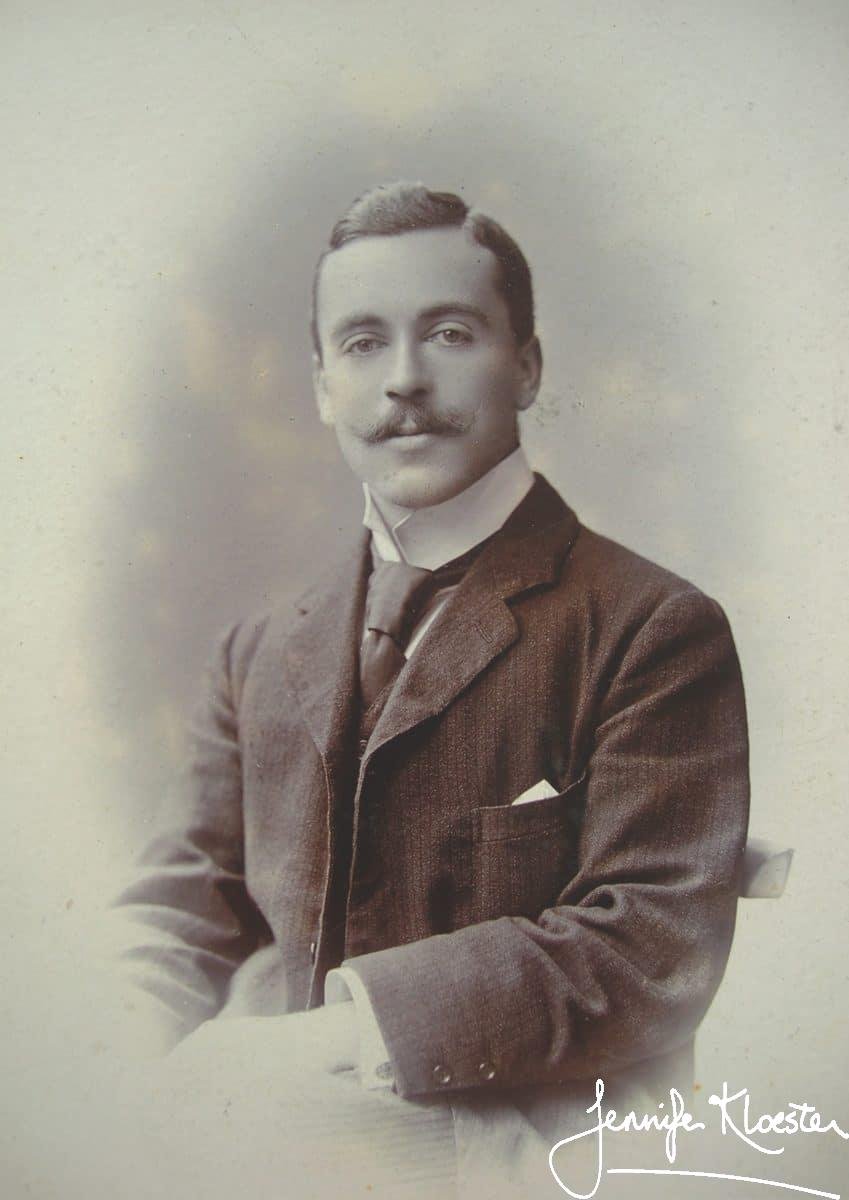George Heyer at Cambridge
In 1888, at the age of 19, George Heyer won a place at Cambridge university. He had done well at King’s College School., having won academic prizes at every year level, including prizes in Literature, French, Greek and Mathematics. His well-to-do middle-class family intended him to be an ‘English Gentleman’ – an independent man of means who could indulge his passion for literature and theatre , travel, and move up the social ladder. Unfortunately, the 1880’s depression meant there was not enough money to enable George to achieve his father’s ambition. Instead, George was accepted as a sizar student at Sidney Sussex College, Cambridge. Sizar students were those with limited means who were admitted to their College at a lower fee. They did not have to pay for food or tuition and were given lodgings at a reduced rate. Originally, the sizar student was required to undertake certain domestic duties in return for these allowances, but this requirement was obsolete by the end of the nineteenth century. On 1st October 1888, at the beginning of the Michaelmas term, George Heyer entered Sidney Sussex College, taking rooms in C2 on the second floor of Hall Court. He was enrolled in the Classical Tripos – a three-year course requiring the study of Greek and Latin literature, Greek and Roman history and Classical authors including Plato, Aristotle, Cicero, Pliny, Plutarch and Pausanias – great writers who George would one day introduce to his daughter, Georgette Heyer, and on whom they would leave a lasting impression.

A Popular Scholar
George loved his time at Cambridge. He was popular with his fellow students and an active participant in poetry-readings, tennis matches and the general rough and tumble of university life. In his third and fourth years at the university he became part of the literary set and had several of his poems published in the famous Cambridge magazine, Granta. First published in 1889, Granta’ s editor was Rudolph Lehmann who would later join the editorial board of Punch. Many of the contributors to The Granta went on to be published in Punch – George Heyer among them. Lehmann was only one among many of George’s Cambridge friends who appreciated his wit and charm of manner. At one poetry reading Lehmann expressed his “frank enjoyment when B.I.N.K., a new man, began with a Pantoum. Rudie came down at once on a single Cockney rhyme and he got it mended; but he clearly liked the fun of it, and the art – and the idea of having in the Granta the kind of thing Austin Dobson and Andrew Lang were doing in those days.”[i]

A Mysterious Nickname
B.I.N.K. (also ‘Blinker’) was George’s nickname at Cambridge and he used it as his nom de plume whenever he was published in The Granta or, after graduation, in the Sidney Sussex Alumni magazine, The Pheon. The poem which Lehmann had enjoyed was ‘In the Lent Term’ published in The Granta on 13 February 1892. It is a light-hearted account of George trying to study Greek while a friend tempts him from his books to a tennis match at nearby Leys. A pantoum is a particularly challenging form of poetry which requires the writer to create a series of four-line stanzas in which the second and fourth lines of each verse are repeated as the first and third lines of the next. George wrote it with ‘apologies to Austin Dobson’, a well-known poet of the time who often favoured the style
A Clever Poem – a Pantoum
IN THE LENT TERM (With aplogies to Mr Austin Dobson)
AFTERNOON working is nauseous,
(Bother that man in the court!)
Though it was best to be cautious,
It’s suicide almost to sport.
Bother that man in the court:
“Blinker, I’ve something to say”–
It’s suicide almost to sport,
And doubtless he’ll soon go away.
“Blinker, I’ve something to say”–
He may yell, but he’ll find it no catch,
And doubtless he’ll soon go away;
Perhaps he is off to a match.
He may yell, but he’ll find it no catch;
I’d better get on with the “Persae;”
Perhaps he is off to the match,
(I remember I want a new jersey).
I’d better get on with the “Persae;”
This chorus might well be in Hindoo;
(I remember I want a new jersey),
“Bang” goes a stone on the window.
This chorus might well be in Hindoo;
–I suppose it’s that idiot again;
“Bang” goes a stone on the window;
Dash it! he’s broken a pane.
I suppose it’s that idiot again,
He thinks in the end he will win;
Dash it! he’s broken a pane,
There’s a horrible draught coming in.
He thinks in the end he will win;
I’ll stick to it:– “Zev baoile v“– *
There’s a horrible draught coming in,
Great Jupiter! what shall I do?
I’ll stick to it:– “Zev baoile v,
vuv oipa ti av IIepowv–“
Great Jupiter! what shall I do?
I wish he would leave me alone.
“vuv oipa ti av IIepowv–“
He’s coming upstairs, to be sure!
I wish he would leave me alone.
For I never sported my door!
He’s coming upstairs, to be sure!
He says as he enters with ease,
(For I never sported my door),
“We’re off to a match at the Leys.”
He says, as he enters with ease,
That I shouldn’t have been so incautious.
* * * *
We’re off to a match at the Leys;
Afternoon working is nauseous.
B.I.N.K. (the Granta 13 February 1892)
- Apologies for the pseudo-Greek writing. It’s correct in the original but I couldn’t work out how to use Greek letters in WordPress.
Fun with Words
The poem reflects George’s love of writing about the everyday. He liked to capture real moments in his life and his enjoyment of ordinary things. Like his daughter in years to come, he had an eye for detail and an appreciation of human foibles which he frequently chose to depict with humour and a deft pen. His poetry reveals his personality and a love of fun that was greatly appreciated by his peers.
There was a tradition in Granta circles of making up verses (based on lines from a song in Gilbert & Sullivan’s operetta, Patience) to honour contributors. There was great distinction in being versified in this way and the lines composed about George by one of his Sidney Sussex friends, George Weekes (later Vice-Chancellor of the university), give a sense of the energy and enthusiasm that endeared him to so many people:
A waggish and gay young man,
A plenty-to-say young man,
Tell you tales by the score,
Give you nicknames galore,
I'll show you the way young man.
Style and Wit
In later years, Heyer was described by a contemporary as ‘one of the most popular men at Sidney Sussex College’ and there is no doubt that he had an engaging personality and a talent for friendship. Reading his many poems it is also clear that he had an ear for poetic rhythm, rhyme and metre as well as a great sense of style and wit.
In June 1891, George was awarded his Bachelor of Arts degree with a Second Class in Part I of the Classical Tripos. A friend later suggested that it may have been his popularity (and all the activities that went with it) that precluded him from obtaining a First Class degree. In the second half of 1891, he began reading for Art and Archaeology in Part II of the Classical Tripos and the following year he spent his Easter vacation in Greece, where he reveled in visits to Olympia and many of the other ancient sites pertinent to his studies. His travelling companion was a Cambridge friend, George Weekes, later the Reverend Weekes, who became the much-loved Master of Sidney Sussex College from 1918 to 1945 and Vice-Chancellor from 1926-28. Greece proved fascinating trip for a pair of enthusiastic Classical scholars and George enjoyed himself thoroughly. He was in high spirits when he wrote a poem from Olympia on Good Friday 1892, entitled ‘To the Editor’, in which he bemoaned the lack of Cambridge sporting information in Greece and requested the editor to send ‘a wire’ with the results of a recent rowing race. This was just one of several poems published in The Granta in the first half of 1892 and the irresistible urge to write – which he would later pass on to his daughter – saw George give more time to his poetry than to his studies. As a result, in June of that year, he gained only a Third in Part II of the Classical Tripos.
A Poem Written from Olympia
To the Editor
(Olympia, April 15th)
Dear Mr. Editor, your grace
I crave to give my lines a place;
I wish to write about a race.
The article which you devise
Upon the subject, if it's wise,
Will probably apologise,
Because, forsooth, you publish late,
And don’t expect a man would wait
Two weeks to know the winning eight.
No more he would, unless like me
He happened at the time to be
Two thousand miles across the sea.
Just think of it; a week ago
The race was over; all I know
Is that two crews "intend to row."
I gather notions of a sort
About the practice from the short
Excursus of a "Times" report.
The "Times" I do not wish to scold,
But think of a "Sportsman" eight days old
Would well be worth its weight in gold.
There's nothing more for me to do
But finish with a word or two
Of excellent advice to you.
Don’t travel in the Easter Vac.,
But send a wire upon my track;
I'll pay you soon when I get back.
B.I.N.K. The Granta 23 April 1892
[i] FA Rice, (ed.), The Granta and its Contributors, Constable, London, 1924, p.21.




